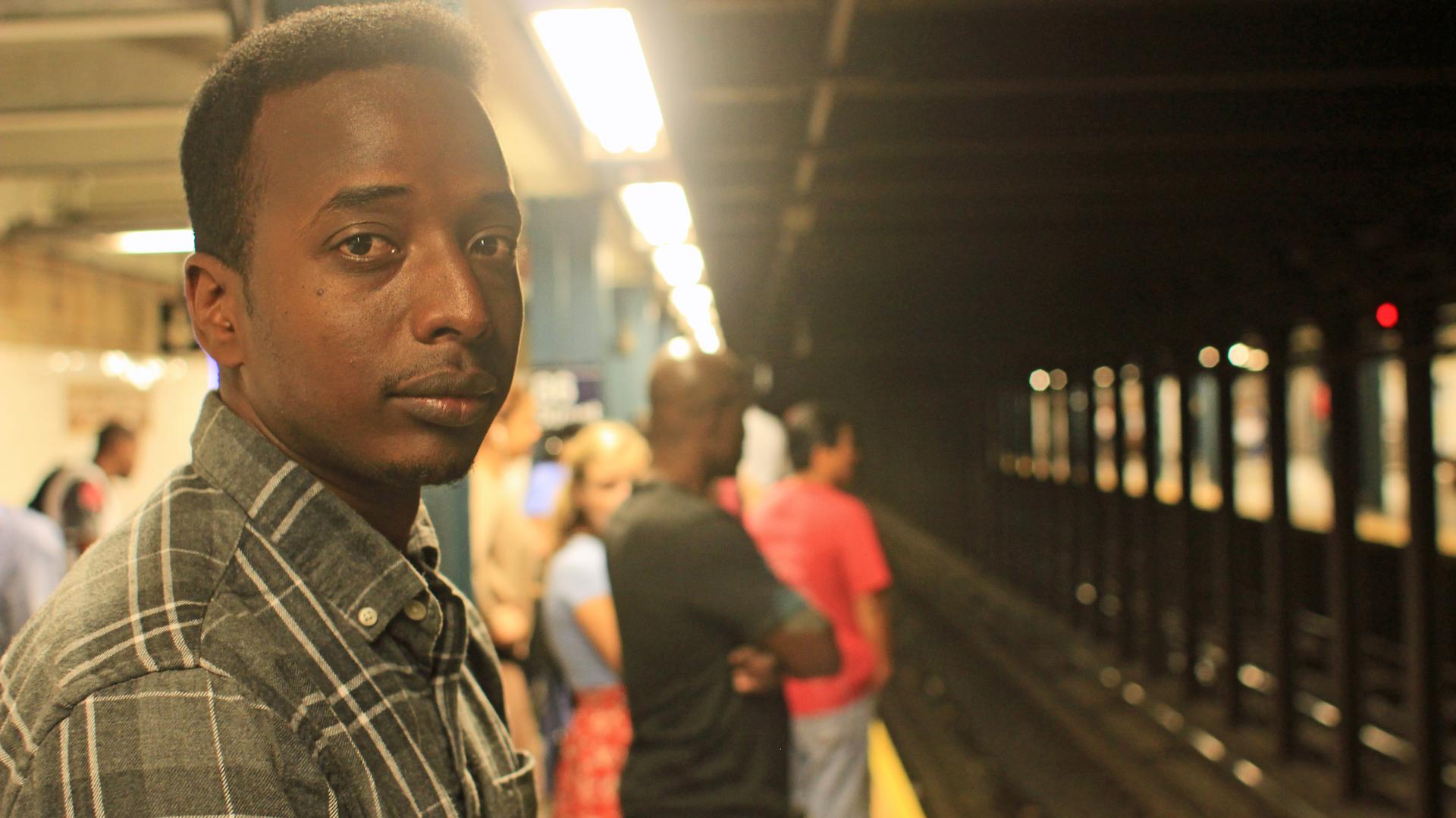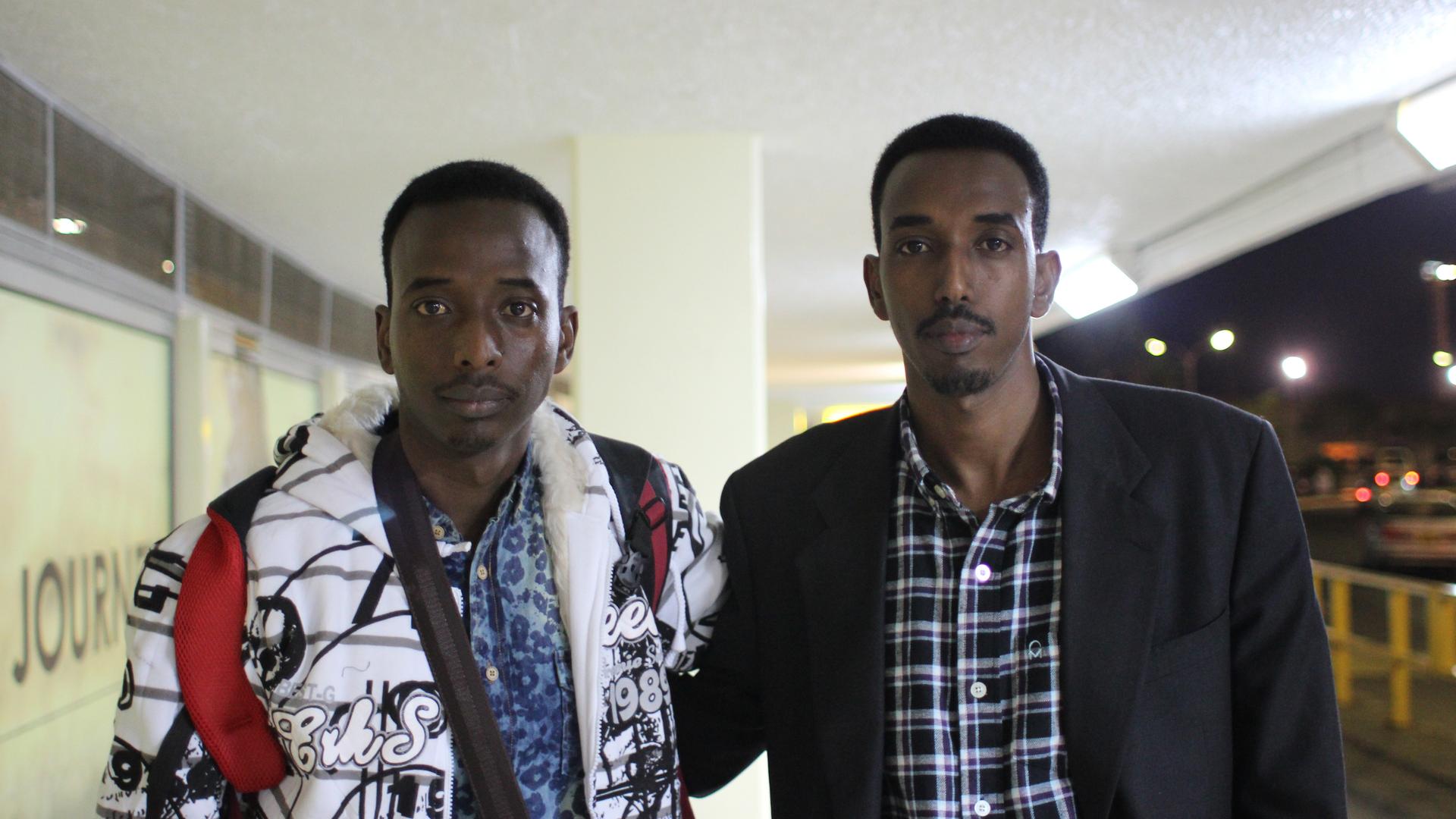Abdi Nor (L) and his older brother Hassan Iftin (R) wish each other well at Nairobi Airport, Aug. 11, 2014. A few minutes after this photo was taken, Abdi boarded a flight to start a new life as a green card holder in Boston. The brothers have not been able to meet since.
The thing about my friend Hassan Iftin is that when things are really bad, his first reaction is to laugh. And to be honest, the past two weeks have been pretty bad if you’re a Somali Muslim refugee, like Hassan, hoping to start a new life in the United States.
When I called him up at his home in Nairobi, Kenya, a few days after the Trump immigration restrictions were announced, he was chuckling. "This is funny. It's really very funny," he told me, just so I knew it wasn’t. "[Trump] is going to do much worse than this. He thinks all that havoc and chaos is working. Ha. Ha. Ha.”
Hassan has been applying for refugee status in the US for years, and was grinding through a further process of appeals and rejections when the executive order was issued. Although the ban has since been suspended by the US courts, he feels the writing is on the wall for his application. But he says he has learned a technique to deal with this kind of situation.
He has become what he calls an "expert in disappointment" — sort of like a master's degree from the University of International Bureaucracy or a diploma from the College of Resettlement Setbacks. It is the kind of expertise you pick up naturally as a refugee, he says. “A problem I expect is not a problem, you see,” he tells me. “The only thing I can do is find other alternatives. That is what I have been doing my entire life.”
It is the same approach that Hassan and his wife take to the fact that there is no safe water to cook or wash with in their neighborhood. It may not be good for their health (or their children's health), but it is at least something they expect. A predictable disappointment.
Contrast that with the attitude of Hassan’s younger brother, Abdi Nor. He also fled from Somalia's Islamist al-Shabab movement. Both brothers were too liberal and Westernized for it ever to be safe for them in Mogadishu. But Abdi hit the jackpot. He won a green card through the US Diversity Visa Lottery (aka the US green card lottery), and has since started a new life in Maine. (You can hear his story in an edition of This American Life. ).

Abdi always struck me as the more optimistic of the two brothers. Even so, when I spoke to Abdi it felt like he was the one who was more upset, and angrier at Trump's policies. Officially, he is the brother who is exempt from Trump's travel restrictions: green card holders, despite some initial actions, are considered admissible to the US.
To put it another way, Abdi is still living the exact American dream that the immigrant and refugee ban has taken away from Hassan. But over the past few years of life in the US, Abdi has been losing his expertise in disappointment. And it shows when you speak to him. He is passionate and politically committed, whereas Hassan is calm and detached. "I'm not disappointed in America," Abdi tells me. "I'm disappointed in Trump."
Perhaps part of that disappointment comes from the fact that Trump is not just a politician to Abdi and Hassan. When they were kids during the civil war in Somalia, they had a handful of books in English that inspired them. One had a man with blond hair on the cover. Abdi remembers it well.
"We found the book 'The Art of the Deal', [with] his pictures on the cover. And we felt like: whoa, Trump! He's an amazing man. He was a wonderful, powerful and rich American. A millionaire and all that. And that is what America looked like to us: If you can go to America, you can be like Donald Trump. But the guy I see today and the guy I read about? Oh my gosh! It's a huge difference. Really. We loved him, but now?"
What Abdi fears most is that a green card willcease to be a guarantee of safety for Muslims and refugees like him who are legally in the country.
"Remember, I'm a Somali. I come from Somalia, one of the countries that [Trump] really doesn't like. That rhetoric and the actions that he's now doing — I think that, at some point, he's going to do something that will directly affect me. I don't know what it's going to be, but I'm really worried."
In Nairobi, in the weeks since the ban, Hassan has sat at home, kept his head down and kept up with the news. It’s the refugee way in Kenya.
Abdi, on the other hand, has been attending meetings in Portland, going on protest marches. Responding to bad news in what he calls the American way.
"Hassan expected me to speak like an American — and I have one foot in the American way. I have so many [American] friends who have sent emails and letters to their congressmen and congresswomen. They feel confident that they are able to talk to their senator and that the senators are representing the people." Abdi says that even in the Somali community in Maine, that confidence in the political process is unusual. "It is very hard to convince a refugee that there is someone representing you — that they can do something for you."
Back in Kenya, Hassan says even though he doesn’t protest or write to politicians, it doesn’t mean he has given up on his dream of starting a new life with his brother. He still wants his voice heard.
"This executive order blocks us from the slim hope, the slim chance I had, and I don't know how else I can show my emotion, instead of with my voice. I can't stand somewhere and cry — no one will listen. The only thing I can do is say how I feel. And that's what I'm doing now. To make people hear us."
The story you just read is available for free because thousands of listeners and readers like you generously support our nonprofit newsroom. Every day, reporters and producers at The World are hard at work bringing you human-centered news from across the globe. But we can’t do it without you: We need your support to ensure we can continue this work for another year.
Make a gift today, and you’ll get us one step closer to our goal of raising $25,000 by June 14. We need your help now more than ever!
